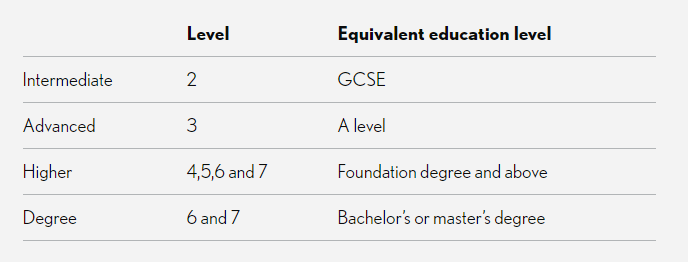What is an Apprenticeship?
An apprenticeship is a paid job where the employee learns and gains valuable experiences.*
Alongside on-the-job training, apprentices spend at least 6 hours minimum of their working week completing classroom-based learning with a college, university or training provider which leads to a nationally recognised qualification.
An apprenticeship includes:
- Paid employment with holiday leave
- Hands-on-experience in a sector/role of interest
- 6 hours a week off-the-job training
- Formal assessment which leads to a nationally recognised qualification
*Apprenticeships.gov.uk
Who can apply for an Apprenticeship?
An apprenticeship is a great paid work opportunity for people over the age of 16 in England who are:*
- Early in their career
- Looking to upskill in their current job
- Looking for a career change
- Not in full-time education
If you do not live in England, check out apprenticeship options in Scotland, Wales or Northern Ireland.
*Apprenticeships.gov.uk
Apprenticeship Levels
Different apprenticeship levels equate to different qualification levels.*
An apprenticeship can start at any level, but some may require:
- Previous qualifications such as English or maths GCSEs
- Additional training in English or maths to ensure the apprentice is at the right level
*Apprenticeships.gov.uk

Mercuri offers apprenticeships starting at level 2 up to level 5.
- Customer Service – Level 3
- Team Leader (CMI Accredited) – Level 3
- Sales Executive – Level 4
- Operations/ Departmental Manager (CMI Accredited) – Level 5

Check out the government website for further details on apprenticeship levels.
Apprenticeship wage
What the apprentice earns will depend on the industry, location and the level of apprenticeship they choose. *
If aged between 16 and 18 or in the first year of the apprenticeship, the apprentice is entitled to the apprentice rate.
If the apprentice is 19 or over and has completed the first year of the apprenticeship, they are entitled to the National Minimum Wage.
This is the minimum an apprentice can earn, many employers offer their apprentices a competitive salary.
There are no student loan or tuition fees for an apprenticeship because it is funded by the government and the employer.
The apprentice will need to cover the cost of their day-to-day expenses, such as lunch and travel, however many employers offer a competitive salary to support this.
*Apprenticeships.gov.uk
Apprenticeship benefits
Apprenticeships are an exciting paid option for anyone wanting to gain experience, upskill or change career because they offer the chance to earn a wage whilst they work and study.
There are many benefits to completing an apprenticeship, which include:
- Experience and skills development
- A nationally recognised qualification (with no tuition fees)
- Employee benefits and a wage
- Exposure to industry professionals
What is off the job?
The Apprenticeship funding rules define off the job as: *
Off-the-job training is a statutory requirement for an English apprenticeship. It is training which is received by the apprentice within their practical period, during the apprentice’s normal working hours, for the purpose of achieving the knowledge, skills and behaviours of the approved apprenticeship that is referenced in the apprenticeship agreement. By normal working hours we mean the hours for which the apprentice would normally be paid, excluding overtime.
Off-the-job training is delivered by subject experts and can include:
- Teaching theory (e.g. classroom lessons, lectures and online learning)
- Practical training (e.g. shadowing, mentoring, industry visits)
- Learning support and time to write assignments
*Apprenticeships.gov.uk
Finding an apprenticeship
All accredited apprenticeship vacancies can be found here.*
By creating an account, you can sign up to be alerted of opportunities in your area of interest and desired location.
You can also use this website to browse what types of apprenticeships are available across different sectors.
Check out Mercuri’s apprenticeship vacancies here.
*Apprenticeships.gov.uk

Apprenticeship related acronyms
Apprentice– An apprentice is a person engaged under an apprenticeship agreement (or alternative arrangement). Apprentices are employed. They work alongside experienced staff, gain job-specific skills, earn a wage, get holiday pay and time for study related to their role.
Apprenticeship agreement– An agreement between an employer and an apprentice in accordance with the Apprenticeships, Skills, Children and Learning (ASCL) Act 2009 sections 32 to 36
Apprenticeship Levy- The apprenticeship levy is a levy on UK employers, who have an annual pay bill of more than £3 million, to fund apprenticeships. The levy is charged at a rate of 0.5% of an employer’s pay bill. Non-levy paying employers will share the cost of training and assessing their apprentices with government – this is called ‘co-investment’. The co-investment rate has changed for new apprenticeships starting on or after 1 April 2019. You will now pay 5% towards the cost of apprenticeship training. The government will pay the rest (95%) up to the funding band maximum. Check out the latest news for Non-levy paying employers. Talk to one of our Apprenticeship Consultants if you have any questions about the apprenticeship levy.
Education Inspection Framework – The education inspection framework sets out how Ofsted will inspect state schools, further education and skills providers, non-association independent schools and registered early years settings in England.
Eligibility– The criteria an individual must meet to be able to do an apprenticeship and get apprenticeship funding. For example, their age, right to work in England, amount of prior learning and the duration of training needed. There are also criteria that an apprenticeship training programme must meet.
ESFA– Education Skills Funding Agency
The ESFA brings together the former responsibilities of the Education Funding Agency (EFA) and Skills Funding Agency (SFA) to create a single agency that is accountable for funding education and skills for children, young people and adults.
Employer agreement– A legally binding agreement between an employer and the Education and Skills Funding Agency (ESFA). Employers must accept this agreement to get or reserve apprenticeship funding.
OFSTED – Office for Standards in Education, Children’s Services and Skills
Ofsted inspect services who provide education and skills for learners of all ages. They also inspect and regulate services that care for children and young people.
EPA– End Point Assessment
Rigorous, robust and independent assessment undertaken by an apprentice at the end of training. EPA tests that the apprentice can:
- Perform in the occupation they have been trained in.
- Demonstrate the duties, Knowledge, Skills and Behaviours set out in the occupational standard.
RoATP – Register of Approved Training Providers
Organisations that are eligible to receive government funding to train apprentices.
ISP – Institute of Sales Professionals
The Association of Professional Sales is the only independent organisation who understands the needs of global sales organisations. It can assess, validate and recognise sellers across providers, companies, and countries. The APS is the end point assessor organisation for Mercuri’s Level 4 Sales Apprenticeship.
KSB – Knowledge, Skills, Behaviours
These are defined as the competences an apprentice will need to demonstrate. The KSBs will form the basis of the apprenticeship’s on-and-off-the-job training.
RPL– Recognition of Prior Learning
Recognition of prior learning is an assessment process that involves assessment of an individual’s relevant prior learning (including formal, informal and non-formal learning) to determine the credit outcomes of an individual application for credit.
Personal learning Record (PLR)– The personal learning record (PLR) allows individual apprentices access to their past and current achievement records. These can be shared with schools, colleges, further education training providers, universities or employers when making an application to further their education, training and employment.
LDC – Learning Development Coach
The Learning and Development Coach will support the Apprentice with progress reviews to guide and assess. They are the main point of contact for the Apprentice.
ULN – Unique Learner Number – widely used in schools and Further Education and increasingly used in higher education.
Gateway – This the point when the Apprentice is almost there and End point Assessment Ready. This must be agreed by the employer organisation, the Apprentice and the learning provider.
Trailblazer group – A group of professionals representing employers involved in developing an apprenticeship standard; recognised by the Institute of Apprenticeships as representative of those who employ people in the occupation. The Level 4 sales apprenticeship standard has been created in conjunction with 29 companies including: Mondottica, Bauer Media, BT, Warburtons, CPM, Whitbread, GlaxoSmithKline, Eric Richmond Limited, Singletrack Limited, Koru, iSales, Pepsico.
Break in Learning – When an individual takes a break of at least 4 weeks from their apprenticeship but plans to return to it in the future. For example, illness, maternity leave or parental leave. This does not include bank holidays, annual leave, redundancy or withdrawals.
Commitment Statement – A statement held by the main provider, the apprentice and their employer. The commitment statement sets out how the apprentice will be supported to successful achievement of the apprenticeship. It must be signed by the apprentice, their employer and the main provider. All three parties must retain a current signed and dated version.
Functional Skills – Paid for delivering the end-point assessment as part of the agreed apprenticeship programme.
Levy-Paying Employer – An employer with an annual bill of over £3 million.
Non Levy Paying Employer – Any employer with an annual bill of less than £3 million can still access levy funded apprenticeships. They can co-invest with the government. This means the government will pay the 95% towards the cost of apprenticeship training and you as an employer will pay 5%.
Framework agreement – a legal contract between the employer and Mercuri for apprenticeships and recruitment.
Age Grant – payable to employers for learners employed 16-18 – payable in two halves – triggered at 90 and 365 days as long as the apprentice remains employed
DAS – Digital apprenticeship service
NAS – National apprenticeship service
BIL – Break in learning
